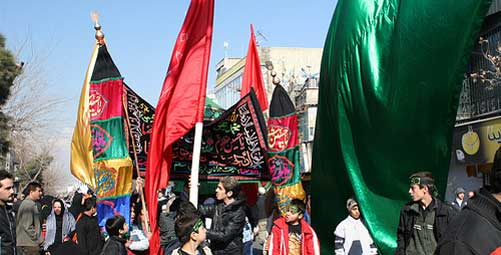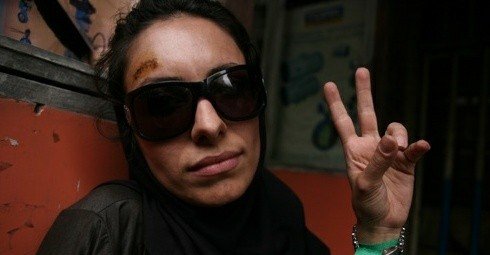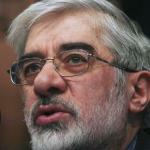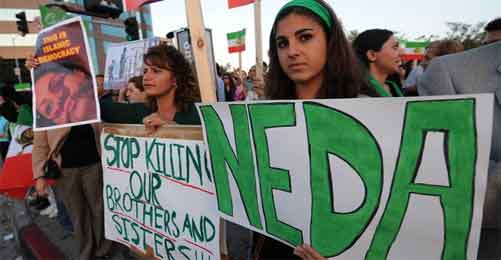A FrommIan UnderstandIng of Iran's Anti-global Political Stand
Iran: Escape from Democracy

"The will of the people shall be the basis of the authority of government; this will shall be expressed in periodic and genuine elections..." Article 21, The Universal declaration of Human Rights
Understanding human behaviour, both individual and social, is by far more difficult than any other scientific challenge. Human being is the only object in the world capable of attaching an abstract attribute to its existence; the attribute of complex and partially unconscious social relations. Through the history, these relations have developed to a complex world of wars, destruction, economic crisis, individual and social unease, and above all, injustice, exploitation and oppression of man by man. All religions, philosophies and ideologies claiming to have an ultimate solution to these problems have failed to do so. Religious, national, and ideological dogmas have but added to man's sufferings.
The solution, perhaps, is not an ultimate answer to the question what to do, but rather an understanding of why and how. Such a common understanding would then serve as the starting point in solving social problems. And there is certainly more to be done before any "ultimate" solution is tested in full scale. The late founders of communism would, no doubt, turn in their graves should they be told of communist projects such as the project of forcing the whole of the Cambodian society into an "industrialized army of agricultural workers" because of misinterpretation (by the criminal warlord Pol-Pot) of one single sentence in their Manifesto.
Mankind's problems require solutions based on common understanding of social problems and solutions agreed upon by a majority of the society. During the history, however, societies have been ruled by groups and classed in control of people's physical or mental lives. By force or by conviction. But today democracy is spreading throughout the world as an alternative to despotic regimes. Nevertheless, people tend to escape from the essence of democracy. They escape from the freedom of mind and become either passive non-voting citizens, or active militants exploited by anti-democratic warlords. Escape from freedom and democracy is the psycho-neurotic foundation of oligarchic, religious, terrorist, racist, and ultra-nationalist socio-political behaviour.
Against the dark background of religious fundamentalism and terror, a new democratic development is unveiling among the young generation in many Middle Eastern societies. This movement is most powerful and interesting to follow in Iran where a Shiite clergy exercises world's first theocratic rule since 1979.
With the waves of modern global economy crawling at its borders, Iran can no longer continue its existence on an oil-based buy-back economic relation with the West. Neither are Western investors satisfied with just selling commodities to countries like Iran. Modern capital grows out of modern globalized production rather than millennium-aged unfair colonial trade of commodities for raw materials. Globalization of production, in its turn, means engagement of the whole world in the process of production, providing "Western" capital and technology with "Eastern" labour and raw materials; a process of producing capital surplus in a de-nationalized free global stock-exchange based market economy. A market where a single stock-basket with shares belonging to everyone; from private weapon industries to socialist trade unions, the Vatican, Shah's huge investments (now owned by Ayatollah Khamenei's social funds), industries owned by the communist party of China, and perhaps even Usama Bin Ladin's Al-Qaida-owned "terror-companies". Today, world economies and stock-exchange markets are communicating vessels where every single employee with retirement savings is connected to every other minor as well as major share-holder.
But why do certain groups and societies react so strongly to the process of modern globalization? What are the motives behind religious, nationalist or political groups' resistance to this bilateral process? And how do religious and national leaders and warlords manage to mobilize such fierce resistance against modern capitalist globalization? Is this because of their socialist, anti-capitalist ideological stands? The answer is no. In the Iranian case, for example, the country is ruled by an anti-communist theocracy with private ownership literally mentioned in Koran as an eternal human right. The question can now be reformulated as: Why are some capitalists against modern capitalism?
A hypothesis can be the Frommian "Escape from Freedom". Old-age pre-industrial capitalism does not necessarily require democracy and legal equality, whereas modern capitalist development is dependent upon these two aspects of political system to the same extent as private ownership and free-market economy. Citizens in a democratic society may be deprived of economical power, but they have the legal power of changing the political system. The system of free elections in a democratic society gives its citizens the right and opportunity of shaping their socio-political life, even if it, at the same time, gives capital owners the right and opportunity to enslave and exploit their labour power by the "free" wage system.
Contrary to developed economies where economical power generates political influence, in countries where pre-industrial capitalism is limited to a free market without tangible individual freedoms, the political system tends to abuse its legal powers to gain economical benefits. Here, power makes you rich. Especially in countries with rich natural resources, such as the oil-rich Iran, political power, rather than capitalist production and surplus-value, is the shortest way to confiscate the national wealth and become a capital owner over a night. But since this capital belongs to every citizen, it needs to be defended against these citizens by despotic methods of governance. So far so good! But these despotic regimes want more. In a world where democracy and human rights are taught in elementary schools as pillars of the modern civil society, even despotic regimes need to be recognized as legitimate governments. Western governments find it easier to enter partnership with governments with a certain degree of (real or supposed) respect for human rights. This is why even the least democratic regimes need to have "democratic names". The Islamic Republic of Iran (IRI) is officially a republican administration elected by its citizens, but practically an oligarchic regime appointed by a faction of the Shiite clergy and the Guardian Army of the Islamic Revolution and some commercial-political groups.
In such a regime, citizens have one "democratic" right; the right to approve the regime whenever it needs to remind the world of its legitimacy. This approval often takes the form of mass demonstrations arranged by the regime itself. Free elections, where individuals have the opportunity to disapprove one administration or president by electing another candidate does not exist or is largely limited. Elections become "selections" and individuals become manipulated masses. This is the point where every individual citizen has to choose between being free in mind or submission to political oppression.
Against the background of Iran's young population structure, the Frommian concept of "Escape from Freedom" is the key to understanding of current socio-political conflict in Iran. A conflict between those who escape from freedom and democracy, and those who have no freedom to escape from.
Erich Fromm is one of the main contributers to the modern science of social psychology. His "Escape from Freedom" is best summarized in the following passage:
"There is only one possible, productive solution for the relationship of individualized man with the world: his active solidarity with all men and his spontaneous activity, love and work, which unite him again with the world, not by primary ties but as a free and independent individual.... However, if the economic, social and political conditions... do not offer a basis for the realization of individuality in the sense just mentioned, while at the same time people have lost those ties which gave them security, this lag makes freedom an unbearable burden. It then becomes identical with doubt, with a kind of life which lacks meaning and direction. Powerful tendencies arise to escape from this kind of freedom into submission or some kind of relationship to man and the world which promises relief from uncertainty, even if it deprives the individual of his freedom." (Erich Fromm, Escape from Freedom [N.Y.: Rinehart, 1941], pp. 36-7
The Iranian youth, women, workers, and the unemployed are "individuals" who are deprived of their economic, social, and political rights and conditions for realization of their individuality in solidarity with the world. What makes their situation totally unsustainable is the fact that these conditions are juristically cemented by "Islamic" (Sharia) legislation. The choice between being free in mind or submission to political oppression is now inescapable. Privileged classes have already chosen to accept the oppression of the rest of the society and stand against a new world opinion demanding democracy and respect for human rights and freedoms as a precondition of being a partner in capitalist globalization. These classes and the oligarchic regime representing them have correctly understood that a simple buy-back trade relation with West does not justify or require such a complex social change as democracy; that they can best protect their unfair privileges by isolating the country (pipelines exempted) from the outside world! In this way, escape from democracy is the political expression of escape from individual freedom at the price of "spontaneous activity, love and work".
The problem is that the New World Order requires more that buy-back relations; it requires "capitalist advancement in partnership" as formulated by Barack Obama. The message was obviously snatched by the majority of the disadvantaged groups and classes who turned the 2009 "selection" show to manifestations against international isolationism, demanding freedom, human rights and democracy. They are relatively educated and aware of their conditions and social injustice. They know that a better world is possible. An almost total apartheid (social, cultural, sexual, economical, professional, political) has made their situation unbearable.
The unprivileged majority of Iranians have no legal freedoms to escape from. For them the only way out is democracy and human rights. The June 2009 uprisings in Iran has clearly shown that they sincerely welcome every individual and group within or close to the Shiite clergy and the Islamic government to join them in their way out of oppression and social injustice. The core of the Iranian problem is the conflict between the privileged classes who escape from freedom, and those who have no freedom to escape from.
True radical social reforms aim at emancipating not only the oppressed, but even the privileged and the oppressor. Many privileged groups have come to this conclusion and signs and expressions of understanding and solidarity with the oppressed groups, especially the large young generation, are not few. Only the least educated and most privileged are escaping from freedom and democracy. The true will of the majority of Iranians is freedom of speech and free elections. Western countries are, too, free to choose solidarity the will of the Iranians, genuine elections; in exchange for "global advancement of modern capitalism" in the Middle East. The question is: who are those, in West, who want to escape from this freedom of choice? And why?
SHIITE CLERICS, NATIONALISTS AND THE IRANIAN LEFT
Will The Iranian Revolution Be Seduced for The Third Time?
IRANIAN DISSENT
Iran's Shiite Clerics at a Crossroad

CONFLICT IN IRAN
Iranian Youth Turns Regime's Weekly Friday Prayer to Protest Meeting

IRAN
God Willing!-A Short Friday Pray to God for Freedom from God’s Regime!

CONFLICT IN IRAN
Globalization and Wells of The Middle East








